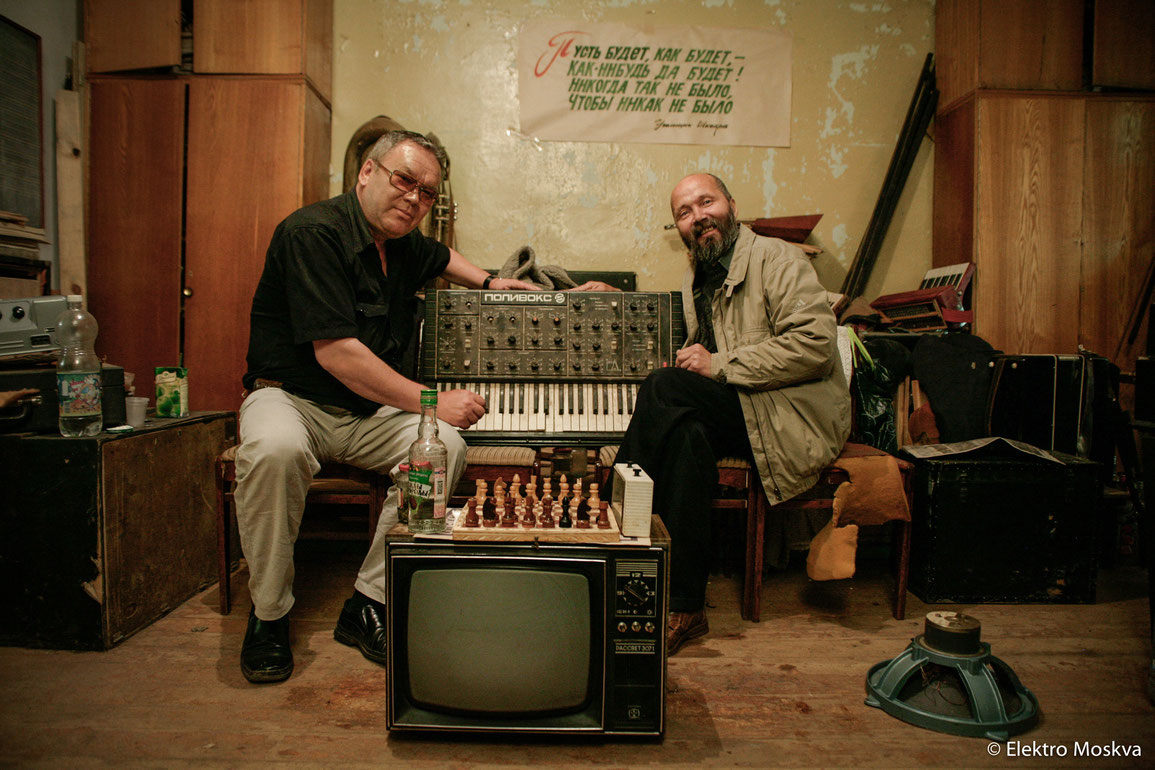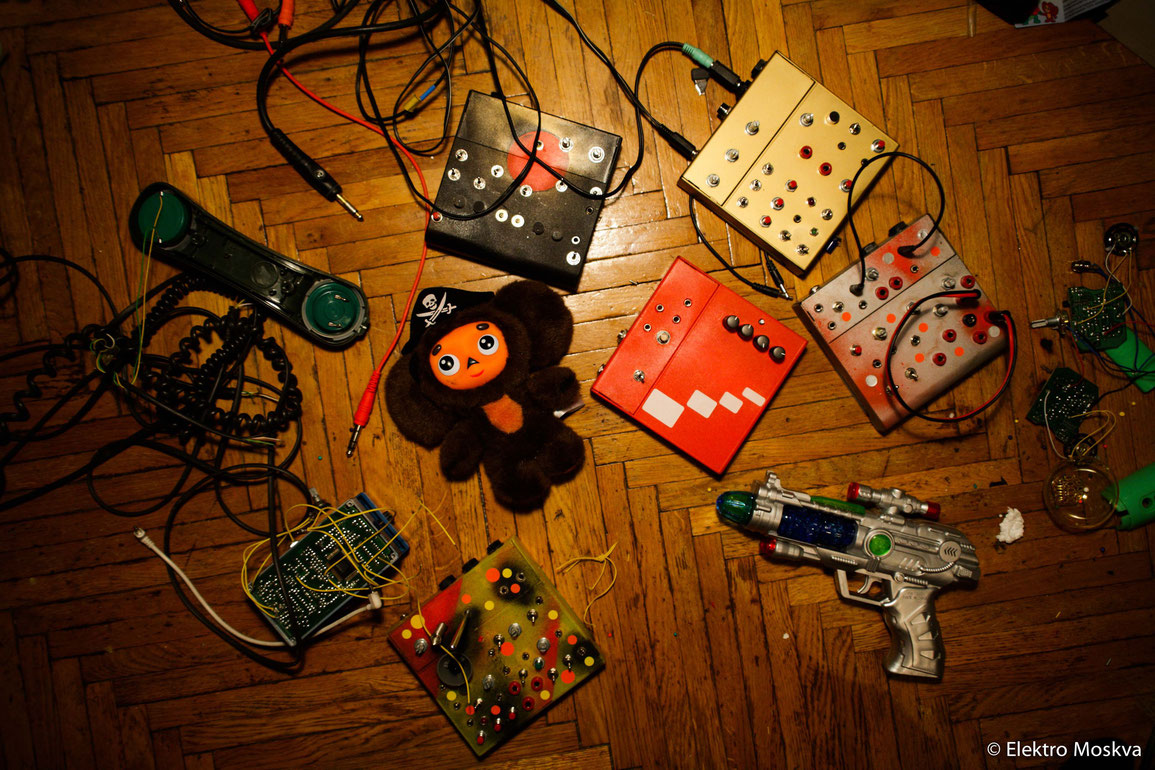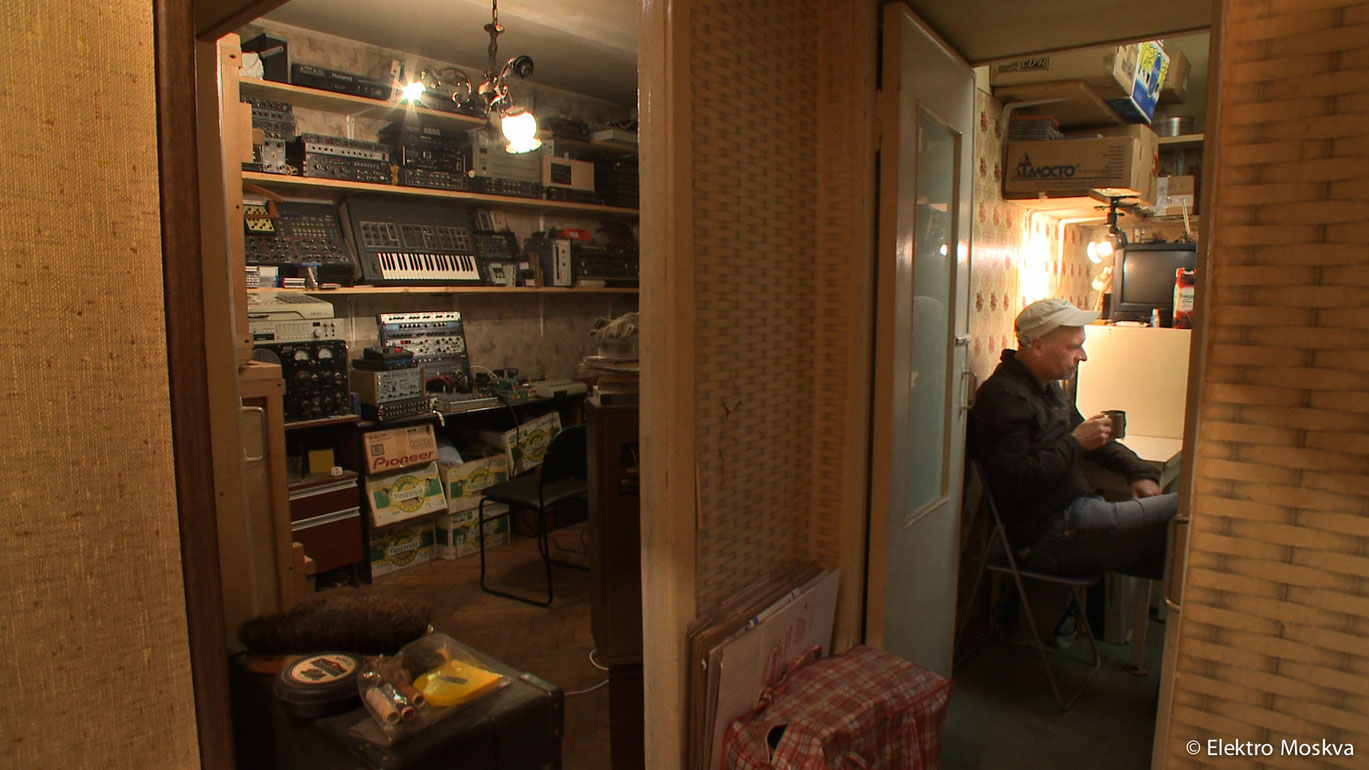Elektro Moskva
Lo-Fi-Sound, klangliche Imperfektion: Sensation. Elektro Moskva ist eine essayistische Erzählung über sowjetische und postsowjetische „Elektrogeschichte“ – von Theremin über Synthesizer bis zu Abhörgeräten des KGB. Zu sphärisch-kosmischen Chillout-Sounds und experimentellen Noisetapeten geraten Sammler und Bastler angesichts der quasi-futuristischen Apparaturen ins Schwärmen. Elektrifizierter Götzenkult zwischen militärischer Praxis und Populärkultur: „You felt like in a spaceship.“ You still do. (prod-note)
„On a western device, you push a button and get a result. On a Soviet instrument, you push a button and get something.“ (Filmzitat: Richardas Norvila aka Benzo)
Elektro Moskva ist eine essayistische Erzählung über das letzte Jahrhundert sowjetischer und postsowjetischer „Elektrogeschichte“, erzählt von Musikern und Erfindern, Genies und Bastlern. Vom „russischen Edison“ Leon Theremin, dem Erfinder eines der ersten elektronischen Musikinstrumente, aber auch von Abhörgeräten für den KGB, von der Space-Ära der 1960er-Jahre und von der Massenproduktion von Synthesizern in den frühen 1980er-Jahren – allesamt Abfallprodukte der Militärindustrie. Heute recycelt und interpretiert eine lebendige elektronische Musikszene dieses Erbe neu und führt es in eine ungewisse Zukunft. Ein Film über den genial-wundersamen Erfindergeist, der trotz oder gerade wegen großer politischer Repression und Gleichschaltung gedeiht. (Produktionsnotiz)
Elena Tikhonova und Dominik Spritzendorfer spüren der Elektrifizierung der kommunistischen Sowjetunion nach. Mit Original-Footage unterfüttert erzählen sie von einem unerschütterlichen Vertrauen in den (gesellschaftlichen) Fortschritt durch und mit Technik. Dabei fokussieren sie vor allem elektromusikalische Apparaturen und Kuriositäten, die im Geiste militärischer Aufrüstung entwickelt wurden und vermittels (il-)legaler Bastler/innen-Leidenschaft Eingang in eine zeitweilig massentaugliche Populärkultur fanden: als Theremin oder Synthesizer – „instruments with expanded abilities“. Während die Musik von Deep Purple oder den Rolling Stones bei Strafandrohung verboten war, erklangen aus den Radios und Fernsehempfängern der UdSSR kosmische Chillout-Tunes – Lo-Fi-Sounds als Soundtrack zum Streben ins All. In Interferenz von Sowjetnostalgie und Liebe zur klanglichen Imperfektion lassen Experimentalmusiker, Bastler und Techniknerds die Apparaturen und Erfindungen dieser Ära auch heute noch hochleben. Es ist eine Art elektrifizierter Götzenkult, der in hingebungsvoller Pflege einiger weniger fortsetzt wird und Aufschluss über das Verhältnis von Politik und Massenkultur in Zeiten des Kommunismus gibt. „You felt like in a spaceship.“ You still do. (Diagonale 2013 / Katalog)
official film website: Elektro Moskva
Indie/Art House Distrib Cinelicious Pics Launches With "Giuseppe Makes A Movie", "Metalhead" and "Elektro Moskva"
Bartok brings his years of film curation and programming to the new venture, which aims to give obscure foreign and indie titles a more lasting life on the art house theatrical circuit and on home video. "I´m spending sometimes months, years to track down obscure fringe genre by Jean-Pierre Melville or Japanese genre films," he told me. "Sometimes I track down a print that screens once, then we have to fly them back. We´re not exploring the full potential of these movies, the new films and the older films that slip through the cracks of film history."
Bartok, who´s organized retrospectives on Melville, Mario Bava, Kinji Fukasaku, Anthony Mann, Sam Fuller, and Monty Python and produced and programmed the third World 3-D Film Expo, will serve as EVP of Acquisitions and Distribution. Korver founded the 4k post house Cinelicious in 2008, overseeing post services on films from Richard Linklater´s Boyhood to the 4k Criterion remaster of Christopher Nolan´s debut film Following. He´ll serve as President and CEO of Cinelicious Pics. Kristine Blumensaadt, Esq is Head of Business Affairs.
Elektro Moskva — Documentary, 89 min., Austria. Welcome to a weird and definitely wired world of musicians, DIY circuit benders, vodka-swilling dealers and urban archaeologists/collectors, all fascinated with obsolete Soviet-era electronic synthesizers: primitive and ungainly beasts like the Polyvox, ESKO, Yunost and the fabulous ANS Photo-Electronic Synthesizer, a surreal device that translates abstract drawings into sound. This strange universe of "cosmic chill-out tunes", Space Age dance music and electronic chirps & tweets has been rescued by directors Elena Tikhonova and Dominik Spritzendorfer in this fascinating & cheeky documentary incorporating rare archival footage including the last 1993 interview with famed inventor Leon Theremin. In a bizarre twist, many of these instruments were a by-product of the Soviet military, created in the off-hours by scientist/inventors cobbling together spare transistors and wires — including Theremin´s Rube Goldberg-esque "Rhythmicon" from 1932, the world´s first rhythm machine, described by a museum curator as "space wreckage". A new generation of avant-garde and rock musicians has embraced the unpredictability and chaos of these instruments: as "Benzo" (aka Richardas Norvila) admiringly says, "On a Western device, you push a button and get a result … On a Soviet instrument, you push a button and get something". Rooting through discarded storage units for cracked and yellowing keyboards, pulling apart cheap toys and re-wiring their inanely cheerful voice boards, these guerilla circuit benders are creating new cosmic sounds from these forgotten "instruments with expanded abilities". In Russian and English, with English subtitles. A selection of the Rotterdam Film Festival.
read the full article: deadline.com
Elektro Moskva
2013
Österreich
89 min
Dokumentarfilm
Russisch
Englisch, Französisch



